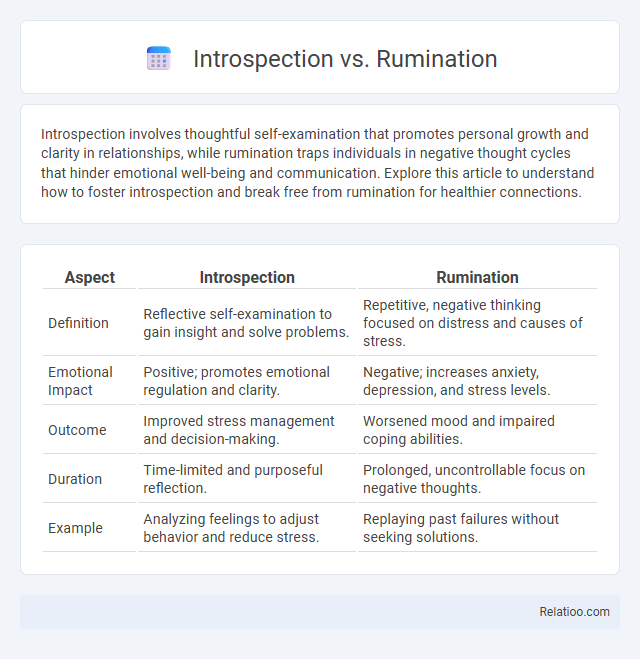Introspection involves thoughtful self-examination that promotes personal growth and clarity in relationships, while rumination traps individuals in negative thought cycles that hinder emotional well-being and communication. Explore this article to understand how to foster introspection and break free from rumination for healthier connections.
Table of Comparison
| Aspect | Introspection | Rumination |
|---|---|---|
| Definition | Reflective self-examination to gain insight and solve problems. | Repetitive, negative thinking focused on distress and causes of stress. |
| Emotional Impact | Positive; promotes emotional regulation and clarity. | Negative; increases anxiety, depression, and stress levels. |
| Outcome | Improved stress management and decision-making. | Worsened mood and impaired coping abilities. |
| Duration | Time-limited and purposeful reflection. | Prolonged, uncontrollable focus on negative thoughts. |
| Example | Analyzing feelings to adjust behavior and reduce stress. | Replaying past failures without seeking solutions. |
Introduction to Introspection and Rumination
Introspection involves your deliberate self-examination to understand thoughts and feelings, fostering clarity and personal growth. Rumination, by contrast, is a repetitive focus on distressing thoughts, often leading to increased anxiety and depression. Differentiating these mental processes is crucial for enhancing emotional well-being and developing effective coping strategies.
Defining Introspection: A Pathway to Self-Understanding
Introspection is the deliberate process of examining your own thoughts, emotions, and motivations to achieve deeper self-understanding, distinct from rumination, which involves repetitive and often negative thinking. Unlike rumination, introspection fosters clarity and insight by encouraging objective reflection rather than obsessive dwelling on problems. This pathway to self-awareness empowers your personal growth by enabling conscious recognition of mental patterns and emotional responses.
Rumination Explained: When Reflection Becomes Unhealthy
Rumination involves repetitive and passive focus on distressing thoughts, often leading to increased anxiety and depression rather than problem-solving. Unlike productive introspection, which helps you gain clarity and self-awareness, rumination traps your mind in negative cycles without generating solutions. Developing insight requires breaking free from rumination patterns to foster healthy reflection and emotional growth.
Key Differences Between Introspection and Rumination
Introspection involves a purposeful self-examination aimed at understanding one's thoughts and feelings, promoting clarity and self-awareness. Rumination, by contrast, is characterized by repetitive and passive focus on negative emotions or problems, often leading to increased distress and impaired mental health. Insight emerges when introspection leads to meaningful realizations and solutions, whereas rumination typically lacks productive outcomes.
Psychological Impacts of Introspection vs Rumination
Introspection involves deliberate self-examination that fosters self-awareness and emotional growth, often leading to positive psychological outcomes such as improved problem-solving and emotional regulation. Rumination, by contrast, consists of repetitive and passive focus on negative feelings and problems, which is strongly linked to increased risk of depression, anxiety, and decreased cognitive functioning. Insight gained through healthy introspection promotes adaptive coping mechanisms, whereas rumination typically exacerbates mental distress and hinders psychological resilience.
Signs You’re Engaging in Introspection or Rumination
Introspection involves deliberate self-reflection aimed at understanding thoughts and emotions, often characterized by balanced and focused questioning. Rumination features repetitive, intrusive thoughts that intensify distress and impair problem-solving, signaled by persistent dwelling on negative experiences without resolution. Insight emerges when introspection leads to clarity and new perspectives, distinguishing it from rumination's cyclical negativity and signaling positive cognitive processing.
Benefits of Healthy Introspection
Healthy introspection fosters self-awareness by enabling individuals to objectively evaluate their thoughts and emotions, promoting emotional regulation and personal growth. Unlike rumination, which involves repetitive negative thinking, introspection encourages constructive reflection that leads to problem-solving and improved mental resilience. Insight gained through healthy introspection supports informed decision-making and enhances overall psychological well-being.
Risks and Consequences of Rumination
Rumination involves repetitive and passive focus on distressing thoughts, significantly increasing the risk of depression and anxiety disorders by amplifying negative emotional states. Unlike introspection, which promotes self-understanding, rumination can lead to cognitive impairments, reduced problem-solving abilities, and decreased motivation. Insight gained through constructive reflection contrasts with rumination's tendency to perpetuate emotional distress and hinder mental health recovery.
Strategies to Shift from Rumination to Introspection
Shifting from rumination to introspection involves cultivating mindfulness practices that enhance awareness without judgment and redirecting repetitive negative thoughts toward constructive self-reflection. Cognitive-behavioral techniques such as journaling, cognitive restructuring, and focusing on problem-solving help transform obsessive thinking patterns into insightful understanding. Engaging in mindfulness meditation promotes a calm mental state, enabling clearer introspective analysis rather than unproductive rumination.
Cultivating Mindful Self-Reflection for Personal Growth
Mindful self-reflection involves intentional introspection, which differs from rumination by promoting constructive awareness rather than repetitive negative thoughts, fostering personal growth through clarity and emotional regulation. Insight emerges from this balanced introspection, enabling deeper understanding of one's behaviors, motivations, and patterns, ultimately supporting adaptive change and resilience. Cultivating mindful self-reflection enhances cognitive flexibility and emotional intelligence, essential for sustained psychological well-being and effective decision-making.

Infographic: Introspection vs Rumination
 relatioo.com
relatioo.com